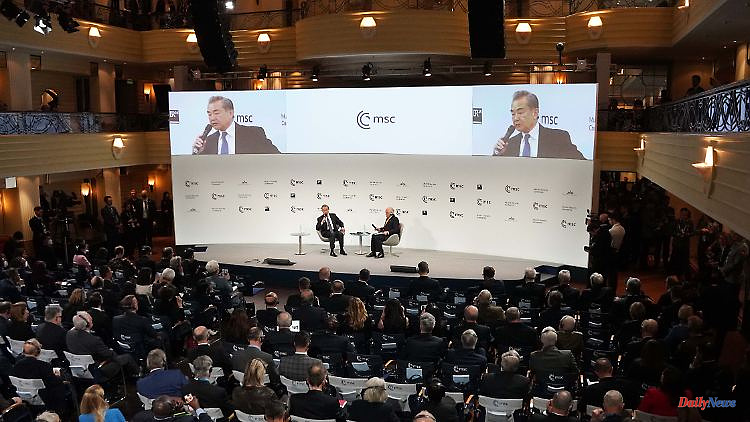Aside from the dominant issue of the war in Ukraine, there is a second conflict of global importance that is occupying diplomats at the security conference: the growing confrontation between the West and China. The representatives of Beijing go on the offensive in Munich.
When China's top diplomat, Wang Yi, entered the stage at the Bayerischer Hof in Munich, he openly heralded a new phase in the conflict between his country and the West. Not only does he call on the United States to stop its "smear campaign" against China and describes the American launch of a Chinese balloon over the United States as a sign of weakness. This Saturday at the Munich Security Conference, the top diplomat is doing something that has so far been very atypical for the government in Beijing: he confidently announced his own proposal to end the Ukraine war, which coincided with the anniversary of the Russian attack on Ukraine should be presented.
"But this is only superficially about ending a war - it's about the struggle with the West for influence in the so-called global South, in the larger rest of the world," said an EU diplomat afterwards. The story that China and Russia's diplomats around the world are telling about Ukraine seems simple: while the West is providing Ukraine with ever-greater military support, they are trying to make peace themselves.
This hits a nerve in large parts of the world, which do not understand the conflict in distant Europe and, in view of the explosion in energy and food prices over the past year, simply want peace. Wang Yi therefore emphasized in Munich that China wants to take care of the real problems facing humanity with the developing and emerging countries.
From a Western point of view, this seems strange at first glance. Chancellor Olaf Scholz and a legion of other interlocutors are calling on China to finally criticize Russia's attack as what Beijing itself has always warned against: a violation of a state's territorial integrity and sovereignty. In fact, Wang Yi at least hinted. He warned against the use of atomic bombs and the instrumentalization of nuclear power plants in the war. And he emphasizes that China is not attacking any country. But the distance from Moscow did not go any further.
In background discussions, Chinese experts like to point out that distancing yourself from your partner Russia is not easy at all, since you are dependent on gas and oil supplies yourself - and unlike Germany, you cannot get liquid gas from the USA as a substitute.
Since the Russian attack on Ukraine, it has become clear to many Western governments that Beijing's narrative resonates in many parts of the world. The economic and political competition is not just bilateral, but on all continents. "Leaving Africa to China would be a huge mistake," Italian Foreign Minister Antonio Tajani warned.
Only Europeans and Americans have to rethink radically. Amrita Narlika, President of the German Institute for Global and Area Studies (GIGA), calls for governments to pay much more attention to what countries in the South need instead of just demanding solidarity from them. She explains Beijing's success with two points. "First, China is able to offer infrastructure investment and support in key sectors, which looks cheap, at least in the short term," she says. "Second, China is better at winning the hearts and minds of developing countries."
While Western leaders are lecturing the Global South on social policy issues, China is talking about sharing those countries' development problems, Narlika says, "And so we see that countries like India are on a whole range of issues, from trade to human rights, stand with China."
That makes the alarm sirens shrill in Berlin too. Chancellor Olaf Scholz wants to ensure that they do not drift away by strengthening contacts with emerging and industrialized countries on other continents. How difficult this is even with democracies is shown by Brazil's lukewarm attitude in the Ukraine war and South Africa's military maneuvers together with China and Russia. That's why two security conferences actually took place this time. The key message from the transatlantic security community at the official conference was "Unity, unity, unity towards Russia," said one of the foreign ministers who attended.
But in many confidential rounds in the salons of the Bayerischer Hof there was a discussion about how to deal with China. This not only revealed a transatlantic divide, which a new study by the Aspen Strategy Group, the Mercis Institute and the MSC describes, but also a division in Europe. The US is looking for a more confrontational style with Beijing and would like to have the Europeans fully at their side in the battle of the superpowers. Sweden's Prime Minister Ulf Kristersson, for example, and the Eastern Europeans also support this - with reference to the dependence on American protection against Russia. Countries like France and Germany, on the other hand, are attempting the balancing act of coordinating closely with the USA on China policy, but still not becoming a mere appendage of Washington.
In any case, the Chinese delegation in Munich was very shocked by how negatively China's image in Europe had changed simply because of Beijing's proximity to Moscow as a result of the Ukraine war, says a diplomat after talks with the Chinese side. That could definitely have a positive effect, so the faint hope. Because Wang Yi also emphasized in Munich how important it is for the Chinese, especially with a view to the tensions with the USA, to at least maintain reasonably good relations with the huge economic partner EU.












